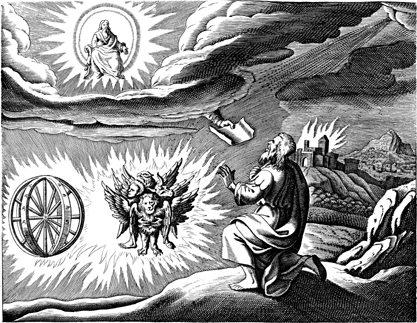The blog to end all blogs. Reviews and comments about all and everything. This blog is NOT affiliated with YouTube, Wikipedia, Microsoft Bing, Gemini, ChatGPT or any commercial vendor! Links don´t imply endorsement. Many posts and comments are ironic. The blogger is not responsible for comments made by others. The languages used are English and Swedish. Content warning: Essentially everything.
Saturday, August 4, 2018
The Church Fathers on Ezekiel and Daniel
"Ancient Christian Commentary on Scripture" is a series of 26 books edited by Thomas C. Oden, a prominent Paleo-Orthodox Methodist.
Oden believes that the Bible should be interpreted through the lens of the Church Fathers, and thus places greater emphasis on Church tradition than evangelicals or Calvinists. "Ancient Christian Commentary on Scripture" is based on this approach. Essentially, it's an encyclopaedia of patristic Bible interpretation. Each volume presents a verse by verse commentary on one or more Biblical books, all commentaries being taken from the writings of ancient or early medieval Church Fathers.
This volume covers Ezekiel and Daniel. I found it interesting to compare the approaches of the Church Fathers with those of modern fundamentalists of the "dispensationalist" variety. The difference is particularly sharp when expounding the meaning of Ezekiel's visions and prophecies. The patristic commentators tended to interpret these figuratively rather than literally. Thus, the four strange beasts seen by Ezekiel when encountering the chariot of God are symbols of the four gospels or the four evangelists. The future temple is heavily allegorized as well. The water pouring forth from it is said to represent baptism, the main gate symbolizes Christian teachers and the closed eastern gate is the perpetual virginity of Mary. Concerning the four tables for the burnt offerings, Gregory the Great offers this interpretation: "The tables have a width of one and a half cubits, because the heart of the saints are spread in breadth of charity for the neighbour they love and see, and they measure one cubit." The literalists won't like this one!
The interpretations of Daniel, on the other hand, are more literal but also more complex. Some prophecies are said to refer to both Antiochus Epiphanes and the future Antichrist. The prophecy of the 70 weeks is interpreted in a non-dispensational manner. The man who makes a strong covenant for one week is Jesus, not the Antichrist. Most patristic commentators believed that the "prince who is to come" was Titus whose Roman legions destroyed the temple during the Jewish War. However, one commentator, Primasius, actually believes that the 70th week is still in the future (!).
As already mentioned, "Ancient Christian Commentary on Scripture" has the format of an encyclopaedia. If you want to know the traditional interpretation of Daniel 9:24, you look up that particular verse, and get a number of commentaries to it from various Church Fathers. While this makes these volumes interesting to leaf through, it also means that you never get to see the patristic commentaries as a unified whole. You only see bits and pieces of them, in this case the bits and pieces commenting specifically on Daniel 9:24. The footnotes and introductions are scanty, so there is very little context. I sure would like to know more about Primasius...
The 26 volumes of this series might be good as reference for a specialized theological library, but I don't think the general reader will appreciate them.
Labels:
Bible,
Christianity
Subscribe to:
Post Comments (Atom)

No comments:
Post a Comment